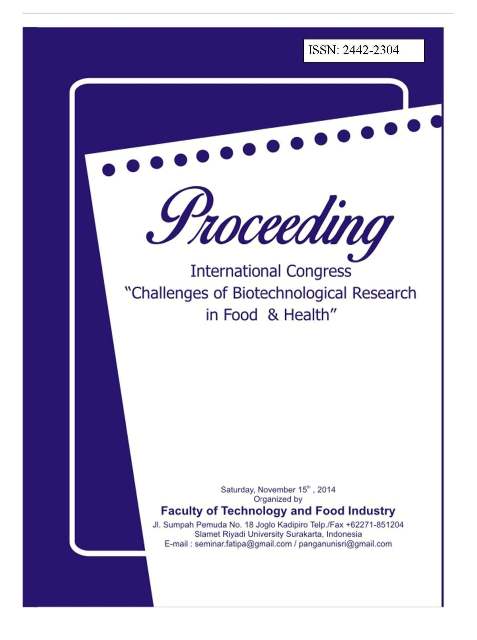ANTIâ€DIABETIC ACTIVITY OF SAMBILOTO EXTRACT (Andrographis paniculata Ness) TO DECREASE BLOOD GLUCOSE LEVEL OF ALOXANâ€INDUCED DIABETIC RAT
Abstract
This research aimed to measure dosage of sambiloto (Andrographis paniculata Ness) extract to decreaseblood glucose level of diabetic rats (Rattus norvegicus). Completely randomized design was applied for
experiment in triplicate sampling and 7 treatments: D0, D1, D2 of normal, diabetic, and 0.9 mg glibenclamide
control, respectively; D3, D4, D5 of 100, 200, 400 mg sambiloto extract respectively; and D6 of 200
mg sambiloto + 0.9 mg glibenclamide; all dosage in 200 g body weight basis of 2 months old male white
Wistar rats weigh ± 200 g for 21 days. Anova and Kruskalâ€Wallis were used as statistic analysis; results then
furtherly analyzed using Moods Median Test at α 5%. Results showed that sambiloto extract at dosage of
100 mg, 200 mg, 400 mg/200 g body weight as well as combination of 200 mg sambiloto + 0.9 glibenclamide
able to reduce rat blood glucose level. Interestingly, 400 mg sambiloto/200 g body weight was comparable
to the result obtain using 0.9 mg glibenclamide/200 g body weight of 56%. While rats treated with
combination of 200 mg sambiloto + 0.9 mg glibenclamide/200 g body weight had 58% lower blood glucose
compare to initial blood glucose level, however hypoglycemic risk need to be considered.
Keywords: antiâ€diabetic, sambiloto extract, blood glucose level
Downloads
Published
2015-04-01
Issue
Section
Artikel

